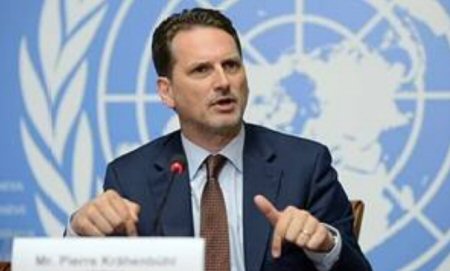The head of the United Nations Relief and Works Agency for Palestine Refugees (UNRWA) has rejected a US call to dismantle the agency, saying it cannot be blamed for the stalemate in the so-called “peace efforts”.
“I unreservedly reject the accompanying narrative that suggests that, somehow, UNRWA is to blame for the continuation of the refugee-hood of Palestine refugees, of their growing numbers and their growing needs,” UNRWA’s Commissioner General Pierre Krähenbuhl said, in a press conference in the Gaza City, on Thursday.
His comments were in response to a question about what Jason Greenblatt, US President Donald Trump’s special representative for international negotiations, provocatively had said a day earlier, claiming that the agency had run its course and was no longer needed.
Addressing the UN Security Council on Wednesday, Greenblatt claimed that UNRWA had been a “bandaid,” and that it was time to hand over services assured by the refugee agency to those countries hosting the Palestinian Arab refugees.
“The UNRWA model has failed the Palestinian people,” he added, according to the PNN.
UNRWA was originally set up in 1949, to take care of hundreds of thousands of Palestinians displaced by the 1948 Arab-Israeli war in the Middle East, mainly through providing them with humanitarian aid.
It was initially established as a temporary agency, but it has continued to provide support for Palestinian refugees for the better part of six decades.
It currently supports more than five million Palestinians in the besieged Gaza Strip, the occupied West Bank, Jordan, Syria and Lebanon, providing them with healthcare, education and social services with funding from international donors.
Most are descendants of the roughly 700,000 Palestinians who were driven out of their homes or fled the 1948 war that led to Israel’s creation.
Last year, however, Washington cut its roughly $300 million annual donation to the UN agency, claiming that it was flawed as Trump’s administration pressed ahead with work on its so-called peace plan.
The US has accused UNRWA of expanding the definition of the refugee so that it includes all descendants of refugees regardless of whether they have taken citizenship in another country.
“The fact that UNRWA still exists today is an illustration of the failure of the parties and the international community to resolve the issue politically — and one cannot deflect the attention onto a humanitarian organization,” the UNRWA head further said, on Thursday.
The UN agency will host a conference on June 25 at which international donors are expected to pledge financial support.
The developments come as the White House is set to hold an economic summit in Bahrain’s capital, Manama, on June 25 and 26, during which the first part of Trump’s “peace plan,” which is spearheaded by his son-in-law Jared Kushner, will be unveiled.
The Trump administration has said that its secret plan would require compromise by both sides.
The plan has been dismissed by Palestinian authorities even before being unveiled. Palestine’s Minister of Social Development Ahmed Majdalani also said, early this week, that Palestinians would not participate in the economic conference in Manama.
Relations between the Palestinian Authority and the US took an unprecedented dip in late 2017, when Washington recognized Jerusalem al-Quds as Israel’s “capital.”
Since then, Palestinians have shown little interest in discussing a plan that they anticipate will fall far short of their core demands.
The Palestinian Authority, led by President Mahmoud Abbas, is facing steep aid cuts. Since being shunned by Palestinians, the White House has slashed hundreds of millions of dollars to humanitarian organizations.
Palestinians want the West Bank as part of a future independent state with East Jerusalem al-Quds as its capital, but Israel insists on maintaining the occupation of Palestinian territories.
Trump has, time and again, called his plan “the deal of the century,” which is coincidentally the title of a 1983 comedy featuring a bunch of hapless arms dealers who compete to sell a weapon, called the Peacemaker, to a South American dictator.

